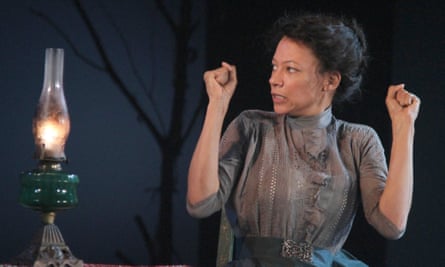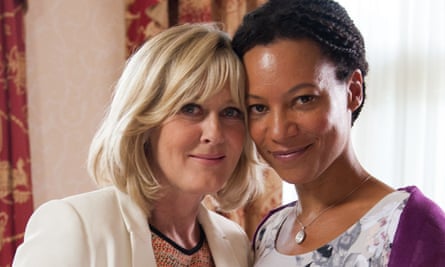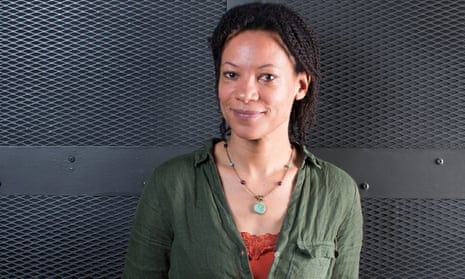People often stop Nina Sosanya in the street, recognising her as Kate, doomed wife of Sarah Lancashire’s character in Last Tango in Halifax, or Lucy Freeman, the increasingly disillusioned head of diversity in the BBC-on-BBC satire W1A. “It’s interesting who comes up to you,” says Sosanya. “With W1A, it tends to be people who work in any kind of corporation. With Last Tango, the most incredibly different people – young, old, white, black, men, women – would want to talk to me, and there was something enchanting about how it seemed to speak to everyone.”
Sosanya will be intrigued to see who stops for a chat after seeing her in Young Chekhov, the trilogy of early works (Platanov, Ivanov, The Seagull) by the Russian dramatist that is transferring to the National Theatre from Chichester. Both characters she plays in Young Chekhov are called Anna Petrovna – a widow in Platonov, a wife in Ivanov – although the latter was born Sarah Abramson, and has a speech, gut-wrenchingly delivered by Sosanya, in which she laments, in David Hare’s translation: “I gave up my religion, my family. I even gave up my name.”
Through Sarah/Anna, who endures rural Russian antisemitism, Chekhov explores the tensions of identity, a question that, as the child of a white English mother and Nigerian father, Sosanya has presumably had to address. “Mmm. Growing up, I was always the minority in the room, even in my own immediate family, who were all white. So it became the norm for me to see white faces everywhere. I remember a young black woman once saying to me, ‘How do you see yourself?’ And I facetiously replied, ‘With a mirror.’ Understandably, she got quite angry. I’ve always referred to myself as ‘mixed race’, but apparently that’s not correct any more. But to call myself ‘black’ would be to deny my mother. There are so many boxes you can put yourself in and the part of the Venn diagram where they overlap is probably who you are.”
Did she use that experience to portray her divided character in Ivanov? “No. No. Well, all right, maybe I do subconsciously ... No, look, thinking about it, yes, I must be drawing on my own experience of being the only one in the room. But she has it more overtly than anything I have had to deal with. I haven’t – touch wood – had to deal with overt racism much in my life.”

Perversely, the biggest moment of her TV career happened off-screen: the death in a car crash, reported without warning by another character – “Chekovian”, as she notes, in everything except the means of transportation – of Kate in Last Tango in Halifax. The writer Sally Wainwright has admitted to having agonised about the character assassination so much that she wrote alternative funereal and cheerful versions of the episode before green-lighting the death scene.
“The producer gave me a call before the scripts arrived and warned me what was coming,” Sosanya recalls. “I wasn’t shocked, I was just sad. I knew that in a third series you need stuff to occur, but I was sad because I thought there was more to do with her. And, let’s be honest, as the actor you’re going: er, I haven’t got a job now. So it was upsetting.”
She remains thrilled by the unusually wide demographic appeal of the series. Might this be due to its subject matter being love and families, which most people have some experience of? “Yes. Even if the characters didn’t look like them. I sometimes think we make too much of ‘representation’. You don’t necessarily need to see yourself on a screen for it to be interesting. For me, ideally ‘diversity’ would mean white audiences watching black shows and the other way round.”
It might be seen as a sign of theatre’s increasing diversity that, even recently, it would have been hard to imagine two major Chekhov roles being cast non-white. “Yes. And yet, even in this [the original Chichester production], in a cast of more than 20, I’m the only non-white. And I’m playing two characters who are outsiders. And so there’s still a long way to go. With the Act for Change campaign, I think some people thought: ‘Really? Still?’ And yes, still, because it actually started to get worse for diverse casting, especially on TV.”

She attributes this slipping back to the plethora of historical costume dramas, co-production money from countries that are less committed to diverse casting, and a feeling that the battle had been won: “They thought they’d done it, but it turns out that you have to keep making the effort. I don’t think there’s any underlying malignancy in this country. It’s just that it’s easy to get lazy.”
Although she briefly returned to Last Tango in Halifax as Kate’s ghost (“Possibly not my finest hour”), she does not expect to figure in any future episodes, although she has hopes for her other high-profile TV franchise. “I really want W1A to come back, but that depends on many things.” Presumably including whether the BBC survives the May government? “Yes. That would be the main one.”
Young Chekhov is at the National Theatre, London, 14 July to 8 October. Box office: 020-7452 3000.

Comments (…)
Sign in or create your Guardian account to join the discussion